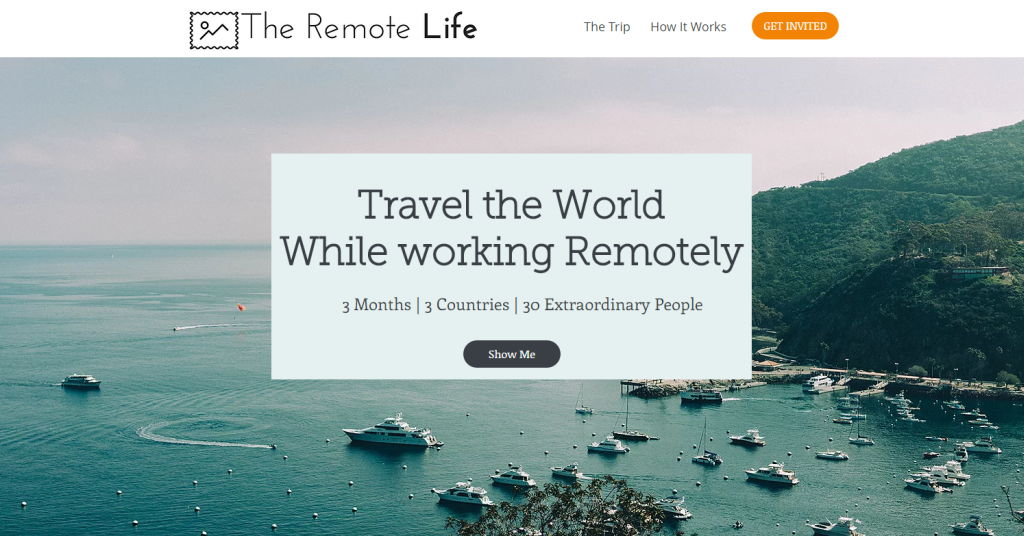If there is one Bollywood movie that gave serious travel to it’s audience, it has to be Zindagi Na Milegi Dobara where three friends travel to Spain for a bachelor trip and as expected the trip turns out to be fruitful for all of them 🙂 For Nishchal Dua, an avid traveller and entrepreneur, that ZNMD moment struck in the year 2016 when he travelled across India & three other countries.
That ZNMD moment made him thinking as to ‘Why be bound to one location even though you have the freedom to travel & move around‘ This is the thought that gave birth to The Remote Life which is on a mission to get more & more people out of their cubicles and into the real world as the team behind the idea rightly believe Work should not come in the way of travel.
The Remote Life was brought into implementation in December 2016 with the simple mantra ‘Travel the world, work remotely and meet awesome people‘. Today we have a chat with Nishchal Dua, Founder & CEO of The Remote Life where we discuss about his entrepreneurial journey, how travel can benefit entrepreneurs/freelancers, etc., nuances of the program, marketing, etc.
So let’s get started with the Q&A…

How did you come up with the idea of The Remote Life ?
I spent the greater part of 2016 travelling across India and to 3 other countries. During this time, I met a lot of people, shared stories and experiences and realized how travel is that one thing that almost everyone wishes for but are not able to do it. And the constraints are not financial but societal. It was during my trek to the Mt. Everest Base Camp when Remote Life started taking shape during discussions with Nitin, Luke, Emma and Chinmoy.
Can you share some details about the team behind The Remote Life
I am a serial entrepreneur and I have travelled extensively. My first company was incubated at IIM-Ahmedabad but soon went sideways and had to be shut down after multiple pivots. From those learnings I started Amicus Shopping Assistant and it was acquired in early 2016. I have worked with MakeMyTrip and Amadeus-both are leading travel companies.
What is the target audience for The Remote Life and some of the countries that are listed as a part of the program ?
The people most keen on joining The Remote Life are entrepreneurs and freelancers who have a stable income as well as the independence to work remotely.
The itinerary currently includes Indonesia, Cambodia & Thailand. We would be expanding to other regions very soon.
Can you walk us through the financials of the program and how it can help entrepreneurs ?
It is possible to join the program for as little as $1100/month and that covers one month of accommodation, office space, food & experiences. We also include visa, insurance, local sim card & airport pickup & drop.
For entrepreneurs specially we have dedicated workshops on Digital Marketing, basics of technology, how to get PR, personal branding and mentorship. Additionally we also have meetups with local entrepreneurs and those across the globe to widen the network and allow ideas to flow.
Any particular reason, there is no mention of Investors [who can join entrepreneurs for The Remote Life] as it might also resulting in funding the entrepreneur’s idea ?
We are open to the idea but not promoting it actively. A constant feedback from the investor community is that it is not very easy for them to work remotely for a month and they would love to join for a couple of days and interact with the entrepreneurs. Also, ‘getting funded’ should not be an entrepreneurs goal.
Can you share some numbers, as to how many entrepreneurs/freelancers/targeted audience have signed up for the program ?
We have received nearly 1200+ sign ups on our website and shortlisted 220 applicants. These 220 applicants will be called by our team to discuss their plans and post that we will finalize the participants.

How much has your experience in Amicus resulted in shaping up the idea of The Remote Life ?
Everything we do leads up to what and how we approach a problem in future. Yes, my experience with Amicus helped a lot in how I think, plan and execute. The mistakes I make now are very different from the ones I have already made with Amicus.
Off late, a lot of startups are moving away from Tier-1 cities like Bangalore, Mumbai, etc. to places that are not predominantly IT driven? Won’t this affect scaling,hiring,etc. w.r.t the startup
The problem with most first time entrepreneurs is how they have only read success stories and interviews and make business decisions based on that. You don’t need to scale or hire unless you have a clear value proposition and business model. Most of the startups can easily be built by 3~4 people in a room with multiple skills between them. I don’t see the point in spending 3~4 hours a day in Bangalore’s traffic and pollution when there’s very little to be gained from it.
Can you name some of the competitors of The Remote Life ?
HackersParadise is doing great. They have built a community of software developers that travel the world and work on cool projects remotely.
How do you ensure to keep the costs of The Remote Life in-tact (without compromising on the experience] ?
I have travelled extensively and built friendships on the way. It’s because of this that I have partners across multiple countries with whom we have exclusive tie ups to ensure the program remains economical. In fact, we are almost 40% more economical than HackersParadise.
What is the funding status of The Remote Life ?
It is entirely self funded. We are not actively looking for investors but love feedback 🙂
2016 was a tough year for startups [especially from funding point of view], how according to you should entrepreneurs deal with such adverse situations ?
I believe it was a really good year. Lots of startups shut down and many more struggled to raise funds forcing them to focus instead on trivial issues like customer acquisition and restructuring the business model.
Can you share some tips for building an effective team for startups [especially the initial core team] ?
Don’t build it. If you go out to hire people for your core team then you’re doing something wrong. Just look at your speed dial or Whatsapp for the people who are closest to you and can be trusted with life. Those are you co-founders. Core team should be about trust and not skill. For skills, you can always hire people.
How important is it for early stage startups to pivot their business model or when is the right time to pivot ?
There is no right answer for this. Startups work because they pivoted, fail because they pivoted and it is only in retrospect that you know what the right time to pivot was.
Your earlier startup was acquired, can you share some tips that can help entrepreneurs who are looking for getting acquired/acqui-hired ?
Focus on one thing. Just one. Is it your user base, your revenue, technology or team? Pick one, make sure you kick ass in that segment and approach the right people with that pitch. But remember your one clear value proposition.
We thank Nishchal for his time and sharing valuable insights for our readers! If you are a freelancer/entrepreneur/travel freak and have the itch to travel (as well as network), head on to Travel programs by The Remote Life If you have any questions for Nishchal Dua & his team about the program, entrepreneurship etc., email them to himanshu.sheth@gmail.com

